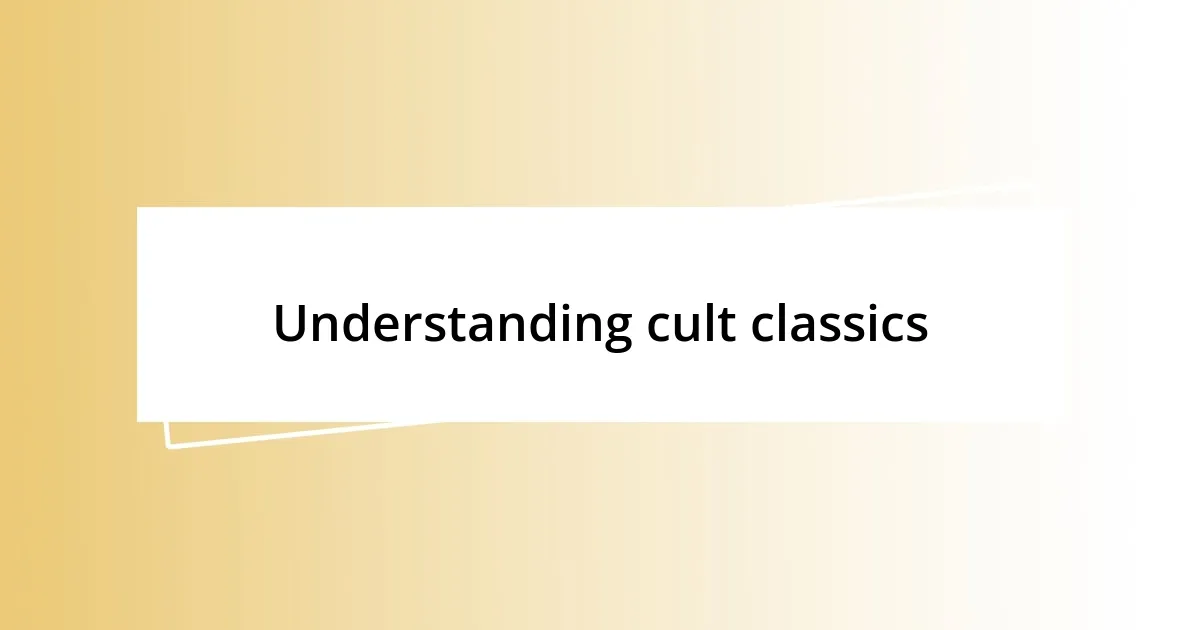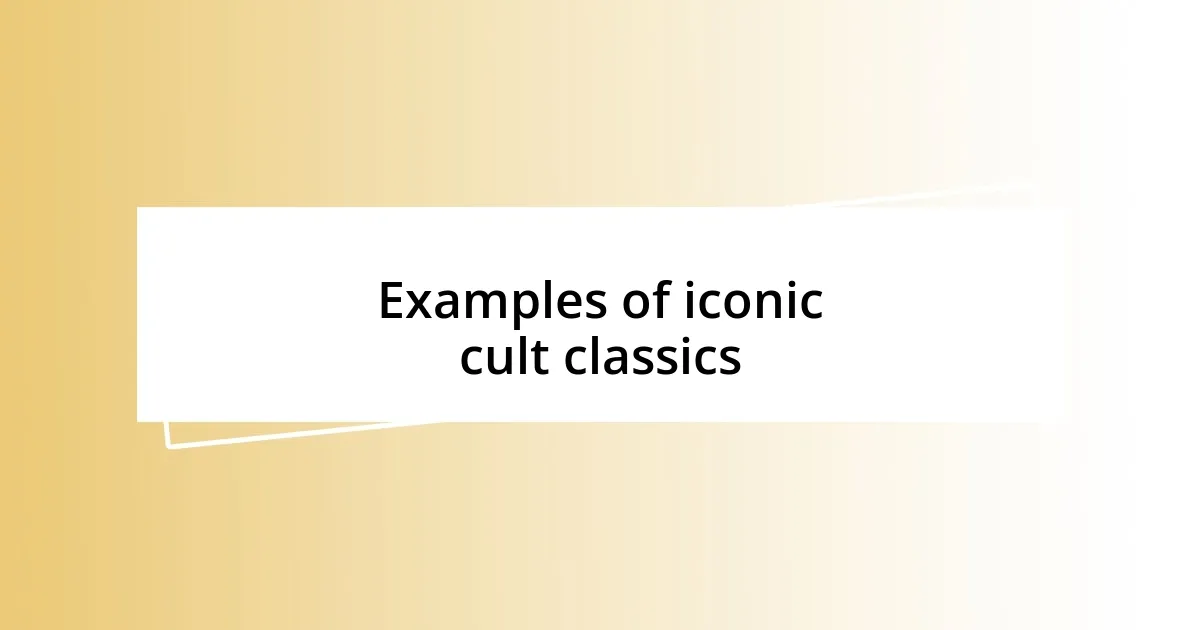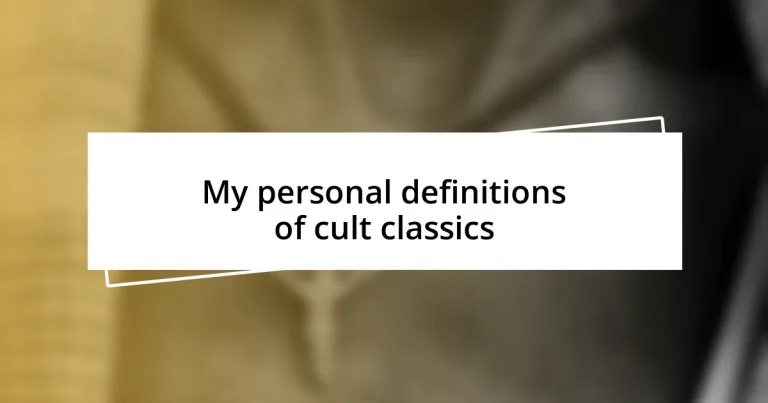Key takeaways:
- Cult classics connect deeply with audiences, often resonating with subcultures and personal experiences.
- Key characteristics include unconventional narratives, a passionate fan base, and an embrace of flaws that enhance their charm.
- These films foster a sense of community, encouraging interactive engagement and shared cultural experiences among fans.
- Cult followings can influence the film industry, prompting sequels and discussions that challenge mainstream norms and provoke social discourse.

Understanding cult classics
Cult classics often transcend their initial reception, becoming beloved not just for their artistry but also for how they resonate with a group of passionate fans. I still remember the first time I saw “The Rocky Horror Picture Show” and felt the electric atmosphere of a midnight screening, where everyone sang along and let their quirks shine. Isn’t it fascinating how these films create a unique space where individuality is celebrated?
What truly sets cult classics apart is their ability to connect deeply with viewers, often tapping into subcultures or themes that mainstream films overlook. For me, watching “Donnie Darko” was like discovering a hidden treasure; the film’s blend of time travel, existential angst, and dark humor perfectly mirrored some of my own adolescent struggles. Have you ever felt that a film just understood you on a level that made it special?
These movies often have a distinctive style or message that strikes a chord, and their inherent flaws can become part of their charm. Take “The Room,” for example—its awkward dialogue and peculiar storytelling are hard to ignore, yet these very imperfections have turned it into an interactive spectacle. Isn’t it incredible how something so unusual can foster a community of fans who can’t help but share their love and laughter?

Key characteristics of cult classics
Cult classics possess a certain magic that allows them to endure well beyond their initial audience. They often feature unconventional narratives or characters that defy typical storytelling conventions, inviting viewers into a world that feels both unique and relatable. I recall the first time I immersed myself in “Clerks.” Its raw dialogue and relatable day-to-day situations made me feel like I was peering into the lives of real people—friends I had yet to meet. That authenticity? It’s what keeps fans coming back.
Another hallmark of cult classics is their passionate, loyal fan base. This community often extends the film’s life through spirited discussions, fan conventions, and even interactive screenings. I remember attending a midnight showing of “The Princess Bride,” where every audience member seemed to know the lines by heart. There’s something touching about how these films create bonds among strangers, all of us united in shared love and nostalgia.
Finally, many cult classics thrive on their flaws, which become integral to their identity. Take “Pulp Fiction,” with its nonlinear storytelling and quirky dialogue—it’s almost as if the movie dares viewers to embrace its unconventional structure wholeheartedly. For me, this kind of filmmaking feels like a delightful invitation to reconsider what a film can be. It begs the question: can imperfection actually enhance the viewing experience? The answer is a resounding yes for all of us who see beyond the conventional lens.
| Characteristic | Description |
|---|---|
| Unconventional Narratives | Stories that diverge from typical storytelling, making them feel fresh and relatable. |
| Passionate Fan Base | A loyal community that keeps the film alive through discussions, screenings, and conventions. |
| Embrace of Flaws | A recognition that imperfections can enhance a film’s charm and uniqueness. |

Examples of iconic cult classics
I’ve come across many iconic cult classics that have left an indelible mark on popular culture. Films like “The Big Lebowski” thrive on their quirky characters and offbeat humor, creating a haven for fans who revel in their absurdity. I can vividly recall quoting, “The Dude abides,” with friends during late-night hangouts—it’s incredible how certain catchphrases become part of our lexicon.
Here are some more examples that stand out:
- “Fight Club”: Its exploration of identity and consumerism resonates with many seeking meaning.
- “Rocky Horror Picture Show”: A dazzling blend of horror and musical, it invites audiences to embrace their eccentricities.
- “Eraserhead”: David Lynch’s surreal nightmare is a journey few forget, often discussed for its unsettling imagery.
- “Heathers”: This dark comedy tackles high school cliques and societal pressure with razor-sharp wit.
Each of these films has fostered a unique community, where fans share laughter and insights, creating their own cultural touchstones. Whether it’s attending themed screenings or quoting unforgettable lines, these cult classics enrich our lives in unexpected ways.

The impact of cult followings
The impact of cult followings is profound and multifaceted. They transform niche films into cultural phenomena, as devoted fans breathe new life into the stories and characters we thought we knew. I remember how excited I felt when I stumbled upon a “Rocky Horror Picture Show” screening in our local theater; it felt electric as the energy of the crowd infused the experience with a sense of belonging. Isn’t it amazing how a movie can create such a strong community?
Moreover, cult followings can drive filmmakers to create sequels or spin-offs based solely on the passionate demand of fans. I once found myself eagerly discussing theories and potential storylines for a sequel to “The Big Lebowski” with fellow enthusiasts online. This kind of engagement not only shapes the legacy of a film but also strengthens the bond among fans, making them feel like they’re part of something bigger. How often do we see fan-based movements righting the wrongs of cancellation?
Interestingly, the enduring nature of cult classics often challenges mainstream norms. They provoke discussions about social issues or artistic expression outside the Hollywood formula. I’ve often pondered how the subversive themes in “Fight Club” sparked fierce debates among my friends. It’s this kind of dialogue that elevates cult films from mere entertainment to cultural critiques, giving us a lens through which to view our own lives and the world around us. Wouldn’t you agree that a movie’s ability to ignite thought and conversation is what truly defines its impact?








